Whole School Provision Map
Background
Students who are on the SEND register will have a student profile in place outlining their individual needs and suggested strategies for support.
Other policies and guidance most relevant to this provision map are:
- SEND Policy
- Behaviour for Learning Policy
- Medical Needs Policy
- Accessibility Plan
- Anti-Bullying Policy
- Equality Policy
- SEND Code of Practice
- SEND 14 Questions School Response
|
Area of Need |
Universal |
Target |
Specialist |
|
Communication and Interaction |
All students’ progress tracked, and key strategies implemented across subjects Differentiated lessons according to students’ ability and learning styles Opportunities for class discussion across the curriculum Consistent encouragement of formal language Visual prompts and aids across the curriculum, which are subject specific Pastoral support from form tutors Opportunities at break and lunch to interact with peers Lucid Exact Screening to identify potential language needs Careers advice to support transition for Year 11 to further education |
Language and Communication assessment Social skills group Student profile circulated to all teachers and support staff LSA intervention in class to support language Regular training for teachers to support children with specific needs Targeted homework club with teaching assistant support Transitional visits and meetings with key staff to support transition for Year 6 Targeted support to complete application process for transition for Year 11 to further education Assessment for Access: Arrangements for exams which may include extra time, reader, scribe, use of laptop |
Further targeted Language and Communication intervention Assessment by Educational Psychologist with advice Referral to outside agency, as appropriate Regular CPD for staff working with children with significant and/or complex needs. Transition sessions to understand expectations of new settings and prepare for changes Parent workshops and coffee mornings/evenings. Transitional visits and meetings with key staff to support transition for Year 11 to further education |
|
Social, Emotional and Mental Health |
All students’ progress tracked, and key strategies implemented across subjects Differentiated lessons according to students’ ability and learning styles Staff presence around the school during structured and unstructured times of the day High expectations of behaviour Clear behavioural steps visible to all children All behaviour recorded and tracked on system PSHE Curriculum Wide variety of extracurricular activities |
Careful consideration of learning profile, in particular language skills Referral to counselling service Key worker Advice from Educational Psychologist Social skills group Break and lunchtime provision Transitional visits and meetings with key staff to support transition for Year 6 Transition groups at start of
|
Pastoral Support Programme Referral to CAMHS Referral to alternative provision Referral to outside agencies Educational Psychologist involvement Young Carers |
|
Cognition and Learning |
All students’ progress tracked, and key strategies implemented across subjects Differentiated lessons according to students’ ability and learning styles Range of resources to encourage cognitive development Lucid Exact Screening to identify potential literacy and SpLD needs |
Language and Communication 6-week programme Literacy group Student profile circulated to all teachers and support staff LSA intervention in class to support language Targeted homework club with teaching assistant support |
Assessment by Educational Psychologist with advice Referral to outside agency, as appropriate Regular CPD for staff working with children with significant and/or complex needs Transition sessions to understand expectations of new settings and prepare for changes Parent workshops and coffee mornings |
|
Sensory/ Physical |
All students’ progress tracked, and key strategies implemented across subjects Differentiated lessons according to students’ ability and learning styles Students walk on the left Blinds on windows Stairwells clearly marked Steps marked with yellow paint Interactive whiteboards in classrooms Extra-curricular clubs and opportunities |
Disabled toilet Space to leave books/equipment throughout the day Pen and pencil grips Student profile with strategies circulated to all teachers and support staff Referral to Occupational Therapy or the Sensory Support Team Observations and feedback by LA Visual Impaired and Hearing-Impaired Service Regular training for teachers to support children with specific needs Transitional visits and meetings with key staff to support transition for Year 6 Targeted support to complete application process for transition for Year 11 to further education Assessment for Access Arrangements which may include extra time, modified papers, use of laptop |
Resources for Occupational therapy/physiotherapy activities Evacuation chair |



